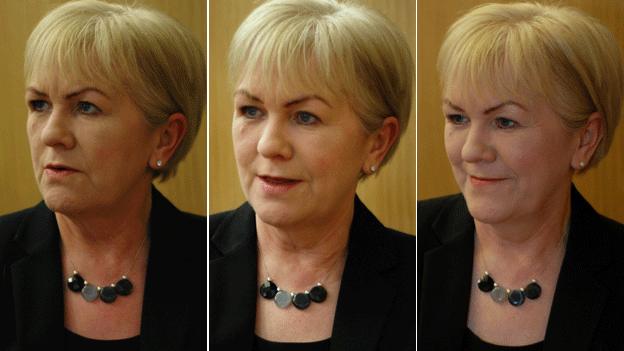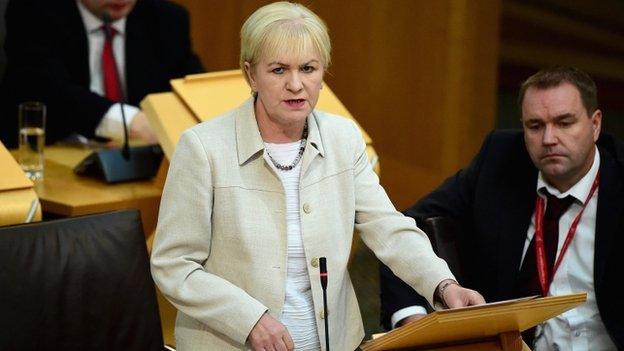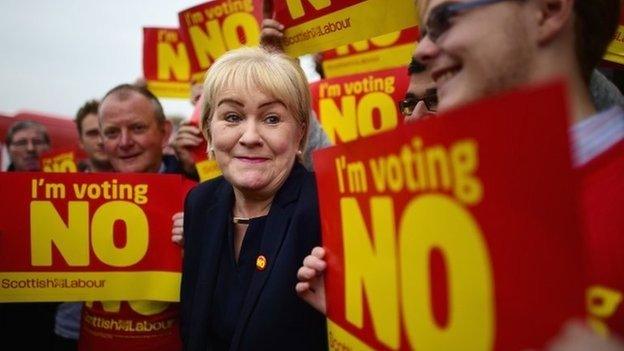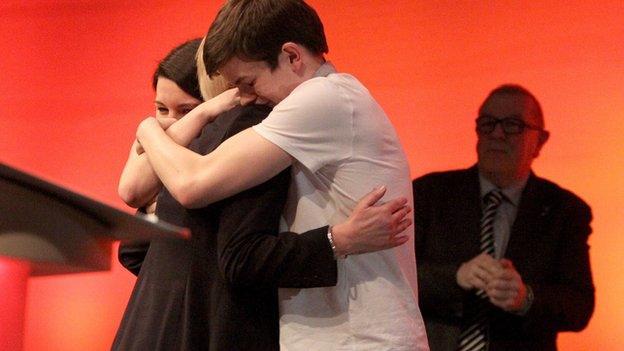Profile: Johann Lamont, former Scottish Labour Party leader
- Published

Johann Lamont took the helm of Labour in Scotland nearly three years ago hoping to "change Scotland, by changing the Scottish Labour Party".
But in an explosive departing shot as leader, she has very publicly blamed her demise on colleagues at Westminster.
The tough talking Glaswegian not only accused the UK leadership of treating Scotland like a "branch office", but went on to dismiss some Labour MPs as "dinosaurs".
It is a fiery departure from a feisty former school teacher who became an MSP in 1999, held ministerial positions within the Scottish Executive, before taking over as leader with that promise of a new lease of life for her party.
Born in Glasgow, into a Gaelic speaking family from Tiree, Ms Lamont attended Woodside Secondary School and obtained a degree from the University of Glasgow.
Party activist
She then did her teaching qualification and went on to work in the classroom for 20 years. She taught English at Springburn Academy and Castlemilk High School and worked alongside social workers to tackle instances of school truancy.
The 56-year-old was active in the Labour Party from her university days, joining the Labour Club - where she was a contemporary of fellow Scottish Labour politician Margaret Curran.
Despite spending two decades as a party activist, she never sought election to the House of Commons during that time and has said she felt there were few chances then for women to be elected to Westminster.

She stood for leadership of the party saying it has "lost its way"
She has described being selected as the Holyrood candidate for Glasgow Pollok in 1999 as "a whole series of accidents".
Having been appointed convener of the Scottish Parliament's Social Justice Committee in 2001, she obtained her first ministerial role in October 2004.
She has long been a strong voice on violence against women and inequality, a mission inspired by her inner city childhood.
While she was deputy communities minister she expressed concern over a Scottish Parliament report in 2005 that Gypsy travellers were experiencing extreme levels of discrimination and, later, as deputy justice minister, she saw through reforms to speed up Scotland's lower court system.
Her commitment to equality also brought out her rebellious side in the early days of devolution, when she became the first Labour MSP to urge ministers to withdraw a move to block Scottish Socialist MSP Tommy Sheridan's bill to abolish poindings and warrant sales.
Ms Lamont's decision to stand for the Labour Party leadership followed the resignation of Iain Gray as leader in the wake of defeat at the 2011 Scottish general election - the second consecutive defeat.
In a speech during that campaign she said the party had "lost our way, lost our confidence and lost Scotland".

In vision: Johann Lamont interviews
Johann Lamont: "I grew up in Anderson in Glasgow, but my heart was in Tiree."

She became the first overall leader after a review of its structure concluded the next to take the role should head the entire Scottish Labour Party rather than just its MSPs.
She took over the reins pledging to "make Labour Scotland's party once again".
At the time, Ms Lamont said: "I want to change Scotland, but the only way we can change Scotland is by changing the Scottish Labour Party."
Under her tenure, the party did win back some of the support it lost in 2011.
She carried out a review of policy on issues like devolution and the party's commitment to free universal public services.
A formidable opponent to First Minister Alex Salmond during parliamentary debates, Ms Lamont was, however, criticised by some commentators for the style she adopted during television interviews.

The Glasgow MSP put in strong performances during First Minister's Question Time at Holyrood

Ms Lamont being greeted by Labour leader Ed Miliband at this year's Scottish Labour Party conference

Ms Lamont played a key part in the cross-party pro-Union movement during the referendum campaign
Ms Lamont was a key figure in the pro-Union Better Together movement during the Scottish independence referendum campaign, sharing a platform with the Scottish Conservatives and Lib Dems.
The mother-of-two was outspoken in her opposition to independence, favouring instead more powers for Holyrood.
Alongside former Prime Minister Gordon Brown, Ms Lamont launched the party's own pro-union campaign, United with Labour in May 2013.
During a speech to the Scottish Labour Party's conference earlier this year, she branded the nationalists' independence campaign "dishonest, deceptive and disgraceful" and pledged to deliver a "power house" Scottish Parliament, with new financial powers.
Labour victory
Scottish voters rejected independence by 55% to 45% but Labour strongholds such as North Lanarkshire, Dundee and Glasgow voted in favour of leaving the UK.
Following the referendum, Ms Lamont said voters had chosen "the best of both worlds" and she said she wanted to lead Labour to victory in the next Holyrood election in 2016.
Political achievements aside, family has always been at the centre of Ms Lamont's life.

Ms Lamont is embraced by her son Colin and daughter Fay during the party's conference, watched by husband Archie Graham
She is married to Archie Graham, the deputy leader of Glasgow City Council, and has a daughter, aged 18, and a 16-year-old son.
Ms Lamont is a keen runner and has said she deals with the stress of her high-profile political career by heading to the gym or watching Coronation Street.
In a BBC interview earlier this year, Ms Lamont was asked whether she would like to be first minister.
"I wouldn't be doing this job unless I thought that was a possibility," she said.
However, her resignation means that ambition is unlikely to ever be realised.